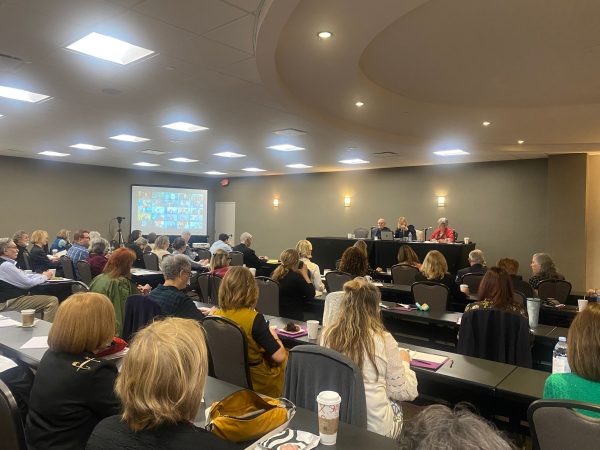Friday April 12, 2024
Today, IPI is back in its weekend conference location at the Rockville Hilton to study The Unstructured Unconscious and the Repressed Unconscious: A Clinical Paradigm for the 21st Century with Howard Levine as IPI’s distinguished guest. We haven’t been here since the weekend conference with Anne Alvarez in February of 2020. The place feels so familiar, even the carpets are the same. Friends I haven’t seen in four years. Students I have met only on Zoom until now. I am sitting in my usual seat at the back of the conference room with colleagues – faculty and students who haven’t seen one another except online alongside new onsite participants, and other old and new faces on a large screen from various states and countries. It is only the second hybrid conference IPI has designed, and we are all curious and eager to participate in the integratino of our onsite and online learning community. It’s a work in progress, an experiment in sharing, sensitivity to the needs of others, and experiencing hybrid as an object of study. “Everyone hates hybrid,” we’ve heard, but our goal at IPI is to develop expertise in creating an effective hybrid learning environment for communicating across cultures.

Now Howard Levine is talking. “Where are we?” he asks. This is the central question for the analytic dyad in the unique epistemological universe that is psychoanalysis. Levine, who is highly conversant with the related elements of theories of Bion, Winnicott, Freud, and Klein, warns us that theories tend to be rather final, exhaustive, exclusive of other ideas, and limiting of growth in the individual psyche and in the field of psychoanalysis. He allows that models highlight characteristic elements which can be useful for making comparisons between various clinical approaches. However, he reminds us that assumptions made by theories and models for understanding neuroses (in which the unconscious is structured by representation of repressed unpleasant experience and desires) cannot be made to apply in the psychoanalytic treatment of all cases. In widening scope cases, the analyst is responding to fragmented or psychosomatically expressed states of mind that are unrepresented because they are non-ideational. The task here is to reach a wordless experience in the unstructured unconscious. Here Levine turns to French psychosomatics and the work of Andre Green. Heady stuff. Clearly Levine likes to know the boundaries and break free of them. His parting shot to us before pausing for discussion — “Are you dislocated enough yet?”
Responding to the word ‘dislocated’, my mind returns to his opening question: “Where are we?” I ask why the sense of place is the central question above all others. He replies that the whole trend in psychoanalysis has been towards knowing and getting it right. So, now we need to valorize the space for not knowing, for instability, and for acknowledging that the unstructured unconscious is a force without meaning. Putting it simply, he says, “There is no there yet.” And that is what we have to be able to resonate with. As for a more complete exploration of my question, Levine responds: “We will have the whole weekend for that!”
And we will be pondering the questions raised for much longer than that.
Jill Scharff

